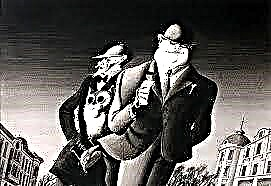In 1843, a young sailor in one of the Pacific harbors - it is easy to recognize the hero of the Taipei novel continuing his journey home - enters the American frigate Neversink. Since there is not a single sailor jacket on the ship after many years of sailing, he is forced to make his own likeness of a canvas shirt and all kinds of rags, and for the light color of improvised clothing he gets the nickname White Pea Jacket. Throughout the voyage, the jacket causes him various troubles, as it sets him apart from the mass of dark-dressed sailors.
The frigate is already returning to America, he has to go around Cape Horn and pass the Atlantic Ocean, but this last part of the voyage takes more than a year. The White Bushlat has enough time to study in great detail the life of the warship and its crew, the peculiar relationships among five hundred people crowding in a very limited ship space, where everything is done in sight, not even minute loneliness is available, and the only place that a sailor can take his own - a suspended bunk, stretched only at night close to others on one of the lower decks.
The white pea jacket is credited with the sailor of mars. Mars, whose watch passes at the very tops of the masts, high above the deck - a kind of sailor aristocracy. The eldest above them is Sergeant Major Jack Chase, an experienced sailor, an extraordinary man, educated, a poetry lover and one of the few on Neversink who happened to participate in real naval battles. Chase is loved by sailors, officers admire him, and even in the tone of the commander, when he addresses him, a note of respect is felt. The foreman favors the White Pea jacket and more than once comes to his aid in difficult situations. The almost unbelievable story that the White Peacock recognizes indicates a very special attitude towards Jack Chase on the frigate: when the foreman deserted from the ship to take part in the Peruvian civil war on the side that he considered to be right, and then, by pure chance, was discovered in one of the ports on the Peruvian military sloop, they just put him back on the Neversink, and this was not followed not only by punishment, but even by demotion.
The case is all the more surprising since any sailor on Neversinka lives in constant expectation of certain punishments, many of which are corporal. The voyage of an American warship, like the voyage of an ancient galley, passes under the whistle of whips. And if with big whips - cats - they still smash revealingly, in the presence of the whole crew, and only the commander of the ship has the right to appoint such flogging, then a molt - a piece of cable with a knot at the end - can be put into operation by order of any officer right on the spot where the sailor was noticed, even if not in misconduct, but at least in ordinary negligence. For more serious crimes - such as desertion or cowardice in a combat situation - special, phased executions are already relied upon, such as driving through a squadron system, when the guilty person is transferred from ship to ship, and on each he receives a new portion of lashes before the system. And in accordance with the maritime regulations, once a month the team reads excerpts from the Code of Laws of War, operating in the Navy and in the absence of direct war; Of the twenty crimes under the jurisdiction of a military tribunal, thirteen are punishable by death, and this is not only about rebellion or attempted assassination - the sailor who simply fell asleep on duty will also be in the loop. The white pea jacket understands that it is not so easy to keep a motley ship crew in obedience, for some members of which the daily Grog charm issued on the ship became the decisive argument in favor of entering the frigate. But nevertheless the excessive cruelty of the naval laws and regulations seemed to him in most cases to be unjustified, and the severity of the punishments did not correspond to the committed misconduct.
Moreover, the officers, for the most part, do not deserve that respect, to the servile manifestation of which, in any case, obliges sailors with the regulations. Drunkenness, inability to make decisions, ignorance of maritime affairs distinguish many officers on Neversinka. But even the most worthless of them (even teenage cadets sent to sail for training and used as errands) can, without hesitation, indulging in their own arrogance, insult the elderly honored sailor, whom the naval law categorically forbids even to object to insult. From the same arrogance, the ship's commander is able to keep the crew on deck without sleep all night during a meaningless speed race with English or French frigates. The arrogance and ignorance of the flagship surgeon, who did not want to heed the opinions of other ship's doctors, lead to the death of a wounded sailor. Many senseless, but supposedly traditional rules, which are carefully monitored by the officers, turn into execution and everyday life on the Neversinka: it’s not necessary to stretch beds in the afternoon - and sailors who have changed from a heavy night shift have no place to sleep; patients from the infirmary located on the lower decks are forbidden to go out into the air - and they are forced to suffer from stuffiness and heat. And many ceremonies between sailors and officers, as well as between senior and junior officers, are useless and even harmful. The White Pea jacket concludes that the cruelty of the commanders, contempt for the sailors, excessive strictness of the routine can only persuade the team to change at the time of the battle and go over to the side of the enemy. For if an officer promises war rapid growth in ranks, and subsequently - honor and prosperity, then it does not bring a sailor even an increase in salary - nothing but mortal danger. And since many of the sailors are not even American citizens, only genuine respect for their commanders and a sense of duty, not undermined by constant humiliation, can make them fight honestly. No wonder the best naval commanders in history were able to do without corporal punishment.
To himself, the White Pea jacket firmly decides that in no case will he expose himself to flogging. And he is trying to fulfill his duties as properly as possible. But one day, during a sailing alarm, he takes the wrong place, because the officer did not tell him in time what exactly he should do. And although the White Pea jacket is trying to make excuses, explaining the situation, they do not believe him and are sentenced by cats. He is already preparing to rush to the commander and fall overboard with him, preferring death to loss of dignity. But Jack Chase and the Marine Corps are in his defense, and the captain - for the first time! - cancels the execution.
In anticipation of the return, many sailors lovingly grow a special style of "sea" beards, sideburns and long curls. The commander’s order to shave and cut everything, as it should be according to the Maritime Charter, almost leads to rebellion. However, the best officer, a born-born sailor nicknamed Shaly Jack, manages to calm the sailors and persuade them to obey. Only the old sailor Ashant never agrees to part with his beard. The captain sends him under the scourge and to the punishment cell for the entire remaining period of sailing - but the spirit of the old man is steady, and when, finally, the roar of the anchor chain is heard, Ashant triumphs, jumping to the upper deck: "At home - and with a beard!"
On the last miles of the journey home, a makeshift jacket almost becomes a shroud to its master. Entangled in its floors, the White Pea jacket breaks into the ocean, and, heavy with water, the jacket pulls it to the bottom, but he manages to free himself by cutting it with a knife. A white spot is mistaken for a shark on board the frigate, and a bunch of serrated harpoons, piercing the ill-fated pea jacket, quickly carries it into the depths.
The white pea jacket will not return to the fleet. And most sailors swear goodbye that they will never again foot on the deck of a warship. But two or three days will pass, and many of them, having lowered their long-term salary to the penniless, will again find themselves in floating barracks in order to subject themselves to humiliation and stick discipline for years to come.












